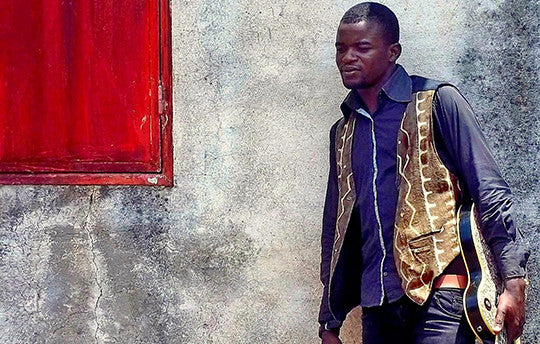Your Cart is Empty

World Music Network is pleased to announce the release Mali Overdrive, the new album by Anansy Cissé. The album is available on 26 May and can be ordered as a one-of purchase, or as part of the World Music Network subscription service.
 Anansy Cissé’s souped-up guitar distortions re-work the West African Desert Blues genre with a new, agitated attitude. Featuring the soku fiddle playing of Zoumana Tereta and accompanied by ngoni, bass and calabash, Cissé’s sound harnesses musical traditions and spits it out anew, taking us into Mali Overdrive.
Anansy Cissé’s souped-up guitar distortions re-work the West African Desert Blues genre with a new, agitated attitude. Featuring the soku fiddle playing of Zoumana Tereta and accompanied by ngoni, bass and calabash, Cissé’s sound harnesses musical traditions and spits it out anew, taking us into Mali Overdrive.
Listen To The Album | Order Here
'Fans of Tinariwen, Terakaft and the names I’ve already dropped will like this disc a lot. Count me in.' - World Music Central
'Are you tired of 'desert blues' yet? Well here's a fresh disc that will make your ears perk up.' - Muzikifan
'This is the type of music we hear with the ears of our heart' - Sing Out
The serendipitous path that lead Riverboat Records to release Mali Overdrive involved the sheer determination and iron will of a good friend, a vintage hoard of bootlegged rock and roll records (more on that later) and of course, Anansy Cissé’s unfettered talent.
When Cissé’s recording ‘Baala’ landed on our website via World Music Network’s online ‘Battle Of The Bands’ competition, we were immediately taken by his souped-up guitar distortions that sucked up all the brilliant aspects of the well-trodden West African Desert Blues and spat them out with a new, agitated attitude.
Now a resident blues bad-boy in Bamako, when Cissé lived in Diré he ran his own recording studio. Based out of his home, he recorded young musicians from his region often adding auto-tune to the vocals and programming backing tracks to the mixes. Cissé’s own style however embraces a more untreated sound, his thickly-cut guitar tone coursing through his arrangements. In late 2012, Cissé was forced to dismantle his studio following the invasion of Mali’s northern regions by militant Islamists, many of whom are opposed to secular music-making. The poignant track ‘Gomni’ calls for peace across Mali and is a reminder of the despair felt by many at the concerning political divisions and connected social reverberations caused by religious tension in the Northern region. Forced to relocate further south, Cissé headed to the beating heart of Mali’s capital city.
In Bamako, Cissé happened to meet Philippe Sanmiguel who is now his percussionist and manager. Together they began to lay down some tracks at a makeshift studio. One day before Cissé’s arrival to the studio, Philippe turned on his new friend’s computer and was shocked to find a veritable trove of well-penned songs noted down. In Cissé’s mind however, these gems were better off performed by others – he simply enjoyed working for other people, gifting them his words, melodies and guitar lines. After some quick-thinking and well-advised persuasion Philippe convinced Cissé to go it alone and record an album of these compositions himself.
Equal stimulation for his songs, text and rhythm is drawn from traditional Fulani and Songhai music. The ngoniand calabash are heard throughout and the themes of the songs cover social issues, love songs, dance themes and tributes to Malian history. ‘Sekou Amadou’ pays tribute to the leader and founder of the Fulani Empire of Macina. The end of the track features a poignant sampling of a speech by the late Nelson Mandela. ‘Horey’ is a takamba song from Gao and Timbuktu. The rhythm is historically linked to the Songhai nobility but electrified and re-energised in Cissé’s version.
In the often-polarised world music community, young African musicians are often either too hastily dismissed as local pop stars who have no international appeal or as authentic saviours in a misplaced quest for authenticity. Now, proudly ramping up the volume and fearlessly taking Malian music into overdrive is Anansy Cissé – a pioneer of new music that champions ancient tradition and uncharted modernity at once.